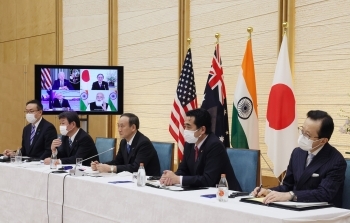Japan-Australia-India-U.S. (Quad)
Japan-Australia-India-U.S. Leaders’ Video Conference
March 13, 2021
 Photo: Cabinet Public Relations Office
Photo: Cabinet Public Relations Office
On March 12, commencing at 10:30 p.m. for approximately 1 hour and 45 minutes, Mr. SUGA Yoshihide, Prime Minister of Japan, with the Hon Scott Morrison, MP, Prime Minister of the Commonwealth of Australia, H.E. Mr. Narendra Modi, Prime Minister of India, and The Honorable Joseph R. Biden, Jr. President of the United States of America, held a video conference. This conference was called for and hosted by the U.S., and after the summit, Joint Statement (English (PDF) / Japanese (PDF)
/ Japanese (PDF) ) and Fact Sheet (English (PDF)
) and Fact Sheet (English (PDF) / Japanese (PDF)
/ Japanese (PDF) ) were released. The overview of the meeting is as follows.
) were released. The overview of the meeting is as follows.
- The four leaders welcomed the realization of the first ever Japan-Australia-India-U.S. Leaders’ Conference.
- The four leaders shared the view that the four countries share basic values and are committed to reinforcing a free and open international order based on the rule of law. They also concurred to further strengthen the quadrilateral cooperation and to support principles such as the rule of law, freedom of navigation and overflight, peaceful settlement of disputes, democratic values and territorial integrity.
- With regard to the “Free and Open Indo-Pacific,”Prime Minister Suga stated that this vision has spread in the international community including ASEAN and Europe, and that they need to cooperate with more countries for the realization of this vision. The four leaders shared the view to cooperate with a range of partners. They also confirmed their strong support for the “ASEAN Outlook on Indo-Pafific,” which is ASEAN’s proactive efforts, and ASEAN’s unity and centrality.
- The four leaders welcomed the progress in advancing practical cooperation among the four countries in various areas such as quality infrastructure, maritime security, counter-terrorism, cyber security, humanitarian assistance/disaster relief, and concurred to launch working groups on vaccine, critical and emerging technologies, and climate change.
- With regard to regional situations, Prime Minister Suga expressed grave concern for deteriorating situation in Myanmar, and explained that Japan was strongly urging the Myanmar military to immediately stop violence against citizens, release those who have been detained including State Counsellor Daw Aung San Suu Kyi, and swiftly restore Myanmar’s democratic political system. The four leaders emphasized the urgent need to restore democracy in Myanmar.
- In the context of the East and South China Seas, Prime Minister Suga expressed strong opposition to unilateral attempts to change the status quo and serious concern with regard to the China’s Coast Guard Law, as it contained problematic articles from the viewpoint of consistency with international law. The four leaders concurred to facilitate collaboration to meet challenges to the maritime order based on rules such as international law including United Nations Convention on the Law of the Sea, in the East and South China Seas. In addition, concerning the decision in the National People’s Congress with regard to an electoral system in Hong Kong, Prime Minister Suga expressed that Japan is strengthening its grave concern, and also expressed serious concern for human rights situations with regard to Xinjiang Uygur Autonomous Region.
- On the situation of North Korea, the four leaders reaffirmed their commitments to complete denuclearlization of North Korea in accordance with U.N. Security Council resolutions. Prime Minister Suga asked for their understanding and cooperation toward an early resolution of the abductions issue, which is the top priority for his administration, and gained support from each country.
- The four leaders concurred to hold an in-person summit by the end of this year.

